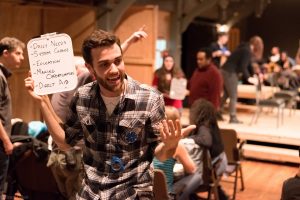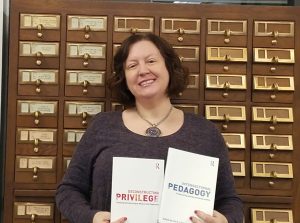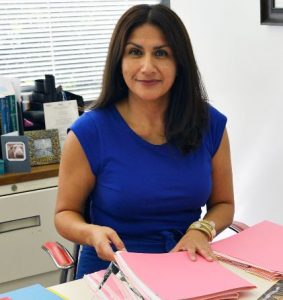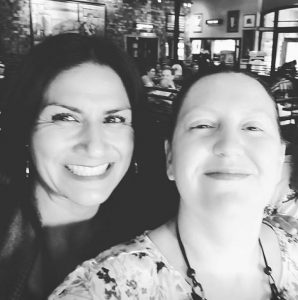Podcast: Play in new window | Download
Subscribe: RSS
 This podcast focuses on intersectional pedagogies, and what the consideration of multiple socially-constructed identities and social locations bring to the learning journey. The conversation is with two leaders in the field, Profs. Kim Case and Desdamona Rios of the University of Houston at Clear Lake. Issues of privilege, power, and social justice are all made clearer in the intersections.
This podcast focuses on intersectional pedagogies, and what the consideration of multiple socially-constructed identities and social locations bring to the learning journey. The conversation is with two leaders in the field, Profs. Kim Case and Desdamona Rios of the University of Houston at Clear Lake. Issues of privilege, power, and social justice are all made clearer in the intersections.
Intersectionality is “a complex analysis of both privileged and oppressed social identities that simultaneously interact to create systemic inequities, and therefore lived experiences of prejudice and discrimination, privilege, and opportunities, and perspectives from particular social locations” (Case, Intersectional Pedagogy).
 Kim A. Case, Ph.D., is Professor of Psychology at the University of Houston-Clear Lake (UHCL) and director of the Applied Social Issues graduate degree. Prof. Case teaches courses She has won multiple teaching and service awards. Her two co-edited books, Deconstructing Privilege: Teaching and Learning as Allies in the Classroom (Routledge, 2013) and Intersectional Pedagogy: Complicating Identity and Social Justice (Routledge, 2017), bring intersectional theories into pedagogical practices. Kim shows us the practical implications and transformative possibilities of prioritizing intersectional issues of race, class, gender, sexuality and the rest in the college classroom.
Kim A. Case, Ph.D., is Professor of Psychology at the University of Houston-Clear Lake (UHCL) and director of the Applied Social Issues graduate degree. Prof. Case teaches courses She has won multiple teaching and service awards. Her two co-edited books, Deconstructing Privilege: Teaching and Learning as Allies in the Classroom (Routledge, 2013) and Intersectional Pedagogy: Complicating Identity and Social Justice (Routledge, 2017), bring intersectional theories into pedagogical practices. Kim shows us the practical implications and transformative possibilities of prioritizing intersectional issues of race, class, gender, sexuality and the rest in the college classroom.
 Desdamona Rios, Ph.D. is associate professor of Psychology at UHCL. She has a joint doctorate in Women’s Studies and Psychology from the University of Michigan. Her research focus is on narrative identities and promise for Latinx American high school students and LGBTQ college students. Prof. Rios has articles in both of Kim’s edited books; in Deconstructing Privilege: “Recognizing Privilege by Reducing Invisibility: The Global Feminisms Project as a Pedagogical Tool” (with Abigail J. Stewart). In Intersectional Pedagogy she has co-written two articles: “Decentering Student ‘Uniqueness’ in Lessons about Intersectionality” (with M. Bowling and J. Harris) and “Infusing Intersectionality: Complicating the Psychology of Women Course.”
Desdamona Rios, Ph.D. is associate professor of Psychology at UHCL. She has a joint doctorate in Women’s Studies and Psychology from the University of Michigan. Her research focus is on narrative identities and promise for Latinx American high school students and LGBTQ college students. Prof. Rios has articles in both of Kim’s edited books; in Deconstructing Privilege: “Recognizing Privilege by Reducing Invisibility: The Global Feminisms Project as a Pedagogical Tool” (with Abigail J. Stewart). In Intersectional Pedagogy she has co-written two articles: “Decentering Student ‘Uniqueness’ in Lessons about Intersectionality” (with M. Bowling and J. Harris) and “Infusing Intersectionality: Complicating the Psychology of Women Course.”
 I’ve invited both scholar-activists to guide us through the complicated and vital issues of intersectional theories and practices in the classroom. They discuss issues of student-centered learning environments, the importance of self care, taking risks in the classroom, the current political moment, and social action.
I’ve invited both scholar-activists to guide us through the complicated and vital issues of intersectional theories and practices in the classroom. They discuss issues of student-centered learning environments, the importance of self care, taking risks in the classroom, the current political moment, and social action.
